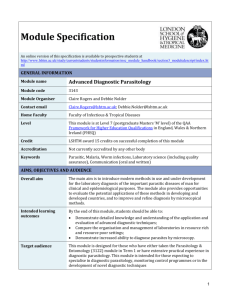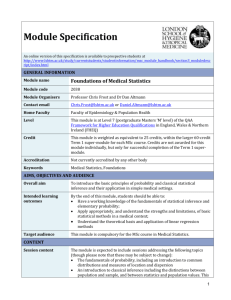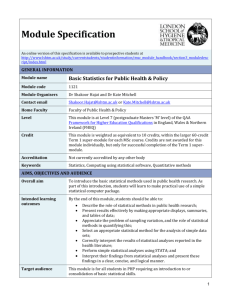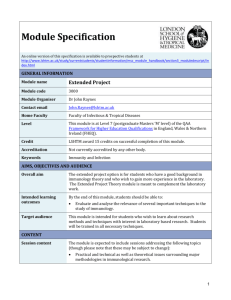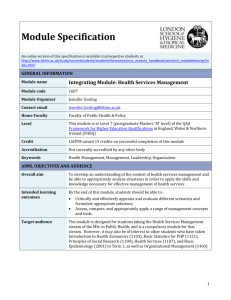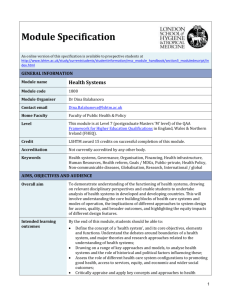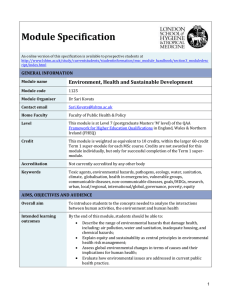3146 Basic Parasitology Module Specification
advertisement
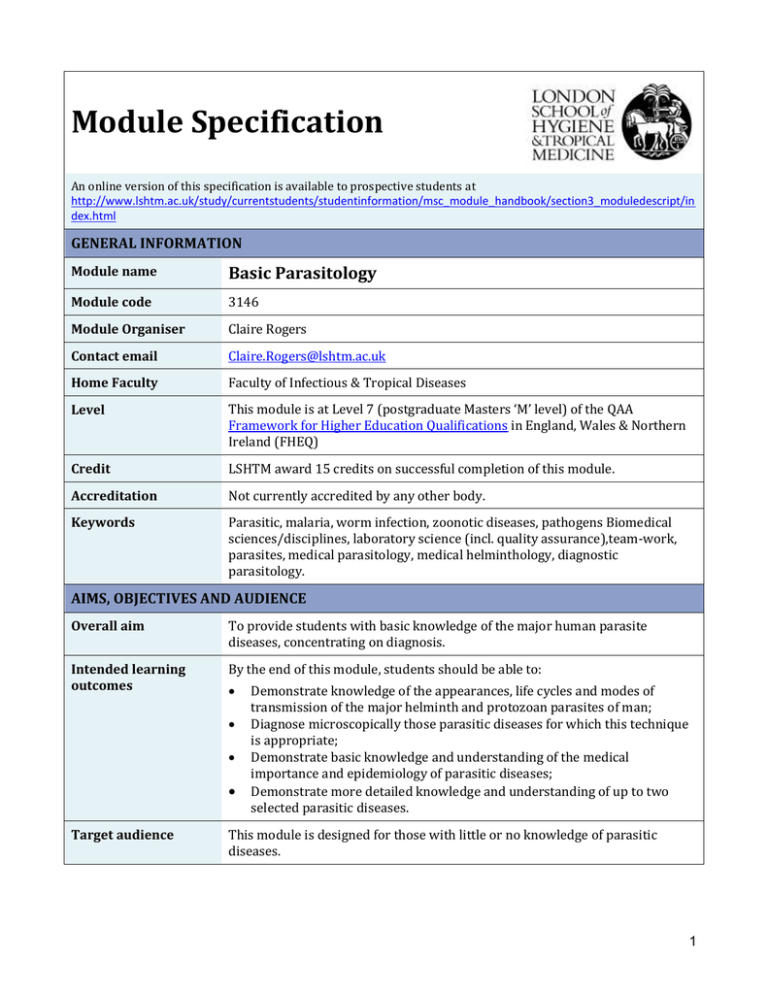
Module Specification An online version of this specification is available to prospective students at http://www.lshtm.ac.uk/study/currentstudents/studentinformation/msc_module_handbook/section3_moduledescript/in dex.html GENERAL INFORMATION Module name Basic Parasitology Module code 3146 Module Organiser Claire Rogers Contact email Claire.Rogers@lshtm.ac.uk Home Faculty Faculty of Infectious & Tropical Diseases Level This module is at Level 7 (postgraduate Masters ‘M’ level) of the QAA Framework for Higher Education Qualifications in England, Wales & Northern Ireland (FHEQ) Credit LSHTM award 15 credits on successful completion of this module. Accreditation Not currently accredited by any other body. Keywords Parasitic, malaria, worm infection, zoonotic diseases, pathogens Biomedical sciences/disciplines, laboratory science (incl. quality assurance),team-work, parasites, medical parasitology, medical helminthology, diagnostic parasitology. AIMS, OBJECTIVES AND AUDIENCE Overall aim To provide students with basic knowledge of the major human parasite diseases, concentrating on diagnosis. Intended learning outcomes By the end of this module, students should be able to: Target audience Demonstrate knowledge of the appearances, life cycles and modes of transmission of the major helminth and protozoan parasites of man; Diagnose microscopically those parasitic diseases for which this technique is appropriate; Demonstrate basic knowledge and understanding of the medical importance and epidemiology of parasitic diseases; Demonstrate more detailed knowledge and understanding of up to two selected parasitic diseases. This module is designed for those with little or no knowledge of parasitic diseases. 1 CONTENT Session content The module is expected to include sessions addressing the following topics (though please note that these may be subject to change): Life-cycles, modes of transmission and appearance of the causative agents of the major parasitic infections including: Malaria; Leishmaniasis; Trypanosomiasis; Amoebiasis; Giardiasis; Coccidial and Opportunistic parasitic infections by, e.g. Toxoplasma, Cryptosporidum, Pneumocystis and Microsporidial species ; Practical skills of microscopical diagnosis of blood, faecal and tissue parasites; Approaches to Parasite Diagnosis , concentrating on those appropriate in low income countries; A brief introduction to Medical Entomology and to the organisation of a diagnostic laboratory; In addition students will, in small groups, research a parasitological topic in depth, prepare a poster and discuss it with the Module Organiser. TEACHING, LEARNING AND ASSESSMENT Study resources provided or required Laboratory handbook provided. Teaching and learning methods Lectures, laboratory practicals and small group work. Assessment details The assessment will consist of two components: evaluation of the group poster presentation (which will result in a group grade) and a practical test. The grades for each will be weighted 40% and 60% respectively and combined to give an overall GPA. For students who are required to re-sit, or granted a deferral or new attempt, the tasks will be an essay covering the same points as the poster (but in less depth) and a practical exam in the same format as the original. Assessment dates Assessments will take place or be due on: Poster assessment Monday 21 March 2016 and Practical exam Wednesday 23 March 2016. For students who are required to re-sit, or who are granted a deferral or new attempt, the next assessment dates/deadlines will be the standard Schoolrecommended date in mid/late September 2016. Language of study and assessment English (please see ‘English language requirements’ below regarding the standard required for entry). 2 TIMING AND MODE OF STUDY Duration The module runs for 5 weeks at 2.5 days per week; this module runs between Monday morning and Wednesday lunchtime. Dates For 2015-16 the module will start on Monday 22 February 2016 and finish on Wednesday 23 March 2016. Timetable slot The module runs in LSHTM timetable slot D1. Mode of Study The module is taught face-to-face in London. Both full-time and part-time students follow the same schedule. For full-time students, other LSHTM modules are available in the other half of the week for the C and D slots. Learning time The notional learning time for the module totals 150 hours, consisting of: Contact time ≈ 32 hours Directed self-study ≈ 60 hours Self-directed learning ≈ 44 hours Assessment, review and revision ≈ 14 hours APPLICATION, ADMISSION AND FEES Pre-requisites There are no formal prerequisites for this module and in particular no prior knowledge of parasitology is expected. In practice, most students choosing this module have some prior clinical laboratory experience but while useful this is not essential. English language requirements A strong command of the English language is necessary to benefit from studying the module. Applicants whose first language is not English or whose prior university studies have not been conducted wholly in English must fulfil LSHTM’s English language requirements, with an acceptable score in an approved test taken in the two years prior to entry. Applicants may be asked to take a test even if the standard conditions have been met. Student numbers Student numbers are typically 15-20 per year; numbers may be capped due to limitations in facilities or staffing. Student selection Preference will be given to LSHTM MSc students particularly those registered for specific courses or who have taken specific prior modules, where applicable and LSHTM research degree students. Other applicants meeting the entry criteria will usually be offered a place in the order applications are received, until any cap on numbers is reached. Applicants may be placed on a waiting list and given priority the next time the module is run. Full Registration (full participation) by LSHTM research degree students is required for this module. Fees For registered LSHTM MSc students, fees for the module are included within MSc fees (given on individual course prospectus pages). If registering specifically for this module, as a stand-alone short course, individual module fees will apply. Tuition fees must be paid in full before commencing the module, or by any fee deadline set by the Registry. 3 Scholarships Scholarships are not available for individual modules. Some potential sources of funding are detailed on the LSHTM website. Admission deadlines For 2015-16: For registered LSHTM MSc students, the module choice deadline (for Term 2 and 3 modules) is Friday 20 November 2015. If registering specifically for this module, applications may be made at any time but, as places are limited, applications ahead of the MSc deadline are strongly advised. All applications should be submitted at the latest 8 weeks prior to the start of the module. Formal registration will take place on the morning of the first day of the module. ABOUT THIS DOCUMENT This module specification applies for the academic year 2015-16 Last revised 4 July 2014 by Claire Rogers Minor amendments SDB 20th July 15 London School of Hygiene & Tropical Medicine, Keppel St., London WC1E 7HT. www.lshtm.ac.uk 4
